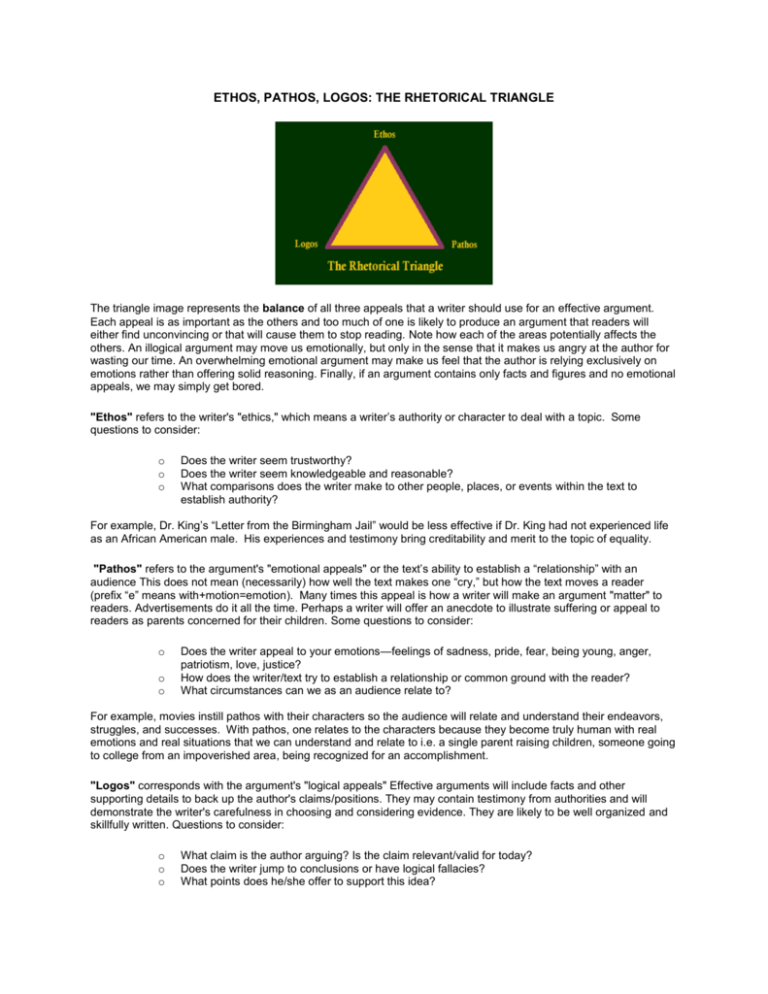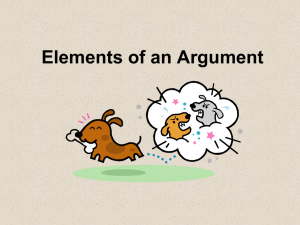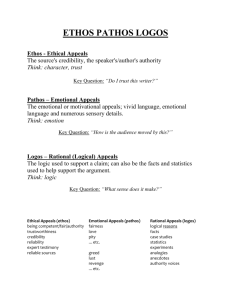Ethos, Pathos, Logos: The Rhetorical Triangle
advertisement

ETHOS, PATHOS, LOGOS: THE RHETORICAL TRIANGLE The triangle image represents the balance of all three appeals that a writer should use for an effective argument. Each appeal is as important as the others and too much of one is likely to produce an argument that readers will either find unconvincing or that will cause them to stop reading. Note how each of the areas potentially affects the others. An illogical argument may move us emotionally, but only in the sense that it makes us angry at the author for wasting our time. An overwhelming emotional argument may make us feel that the author is relying exclusively on emotions rather than offering solid reasoning. Finally, if an argument contains only facts and figures and no emotional appeals, we may simply get bored. "Ethos" refers to the writer's "ethics," which means a writer’s authority or character to deal with a topic. Some questions to consider: o o o Does the writer seem trustworthy? Does the writer seem knowledgeable and reasonable? What comparisons does the writer make to other people, places, or events within the text to establish authority? For example, Dr. King’s “Letter from the Birmingham Jail” would be less effective if Dr. King had not experienced life as an African American male. His experiences and testimony bring creditability and merit to the topic of equality. "Pathos" refers to the argument's "emotional appeals" or the text’s ability to establish a “relationship” with an audience This does not mean (necessarily) how well the text makes one “cry,” but how the text moves a reader (prefix “e” means with+motion=emotion). Many times this appeal is how a writer will make an argument "matter" to readers. Advertisements do it all the time. Perhaps a writer will offer an anecdote to illustrate suffering or appeal to readers as parents concerned for their children. Some questions to consider: o o o Does the writer appeal to your emotions—feelings of sadness, pride, fear, being young, anger, patriotism, love, justice? How does the writer/text try to establish a relationship or common ground with the reader? What circumstances can we as an audience relate to? For example, movies instill pathos with their characters so the audience will relate and understand their endeavors, struggles, and successes. With pathos, one relates to the characters because they become truly human with real emotions and real situations that we can understand and relate to i.e. a single parent raising children, someone going to college from an impoverished area, being recognized for an accomplishment. "Logos" corresponds with the argument's "logical appeals" Effective arguments will include facts and other supporting details to back up the author's claims/positions. They may contain testimony from authorities and will demonstrate the writer's carefulness in choosing and considering evidence. They are likely to be well organized and skillfully written. Questions to consider: o o o What claim is the author arguing? Is the claim relevant/valid for today? Does the writer jump to conclusions or have logical fallacies? What points does he/she offer to support this idea?





